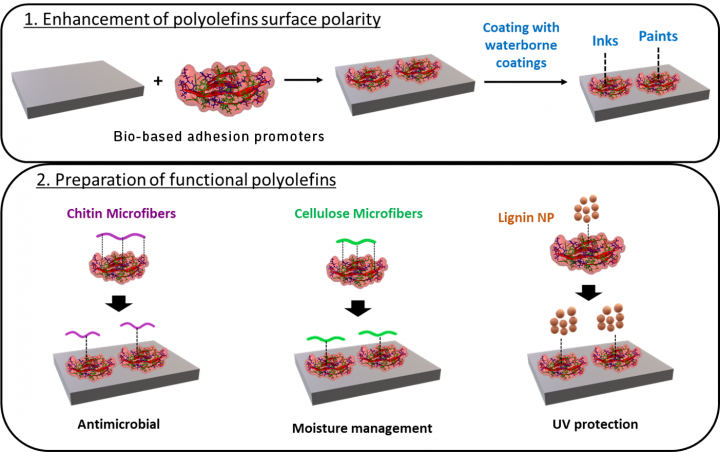Polyolefins (PO) are a class of plastics that are used in many applications ranging from packaging films to textile fabrics. Notwithstanding their advantages (e.g. low cost and chemical resistance), their hydrophobic nature will result in a poor adhesion of waterborne coatings, such as paints, dyes and inks. The adhesion can be improved by coating the PO substrates with petrol-based adhesion promotors.
In line with the European strategy for the transition to a circular bio-economy, the PEBIOTE project aims to develop novel bio-based adhesion promoters using anchor peptides.
- Identification of a variety of anchor peptides showing a strong binding to various substrates
- Engineering of the selected peptides to enhance adhesion
- Determination of the bio-based coating formulations (including inks and paints) with the most promising anchor peptides applied onto plastic films and textile fabrics
- Analysis of the properties such as adhesion strength, and wicking ability of the coated substrates
- Skin irritation tests to meet the regulatory requirements

PO for textile fabrics with novel functionalities
Besides the poor adhesion of waterborne coatings to hydrophobic PO, materials (especially textile fabrics) made from PO have several drawbacks, such as a poor moisture management and a low UV resistance.
PEBIOTE will address these problems by developing functional POs presenting antimicrobial activity, UV protection and moisture management. These aims will be achieved by applying novel bio-based coating solutions based on functionalized anchor peptides. The functional peptides will be engineered by linking the anchor peptides to bio-based additives obtained from lignocellulosic components (cellulose and lignin) and chitin. POs coated with anchor peptides linked to cellulose microfibers will impart hydrophilicity whereas peptides linked to chitin microfibers will render the surface antimicrobial and peptides combined with lignin nanoparticles will improve the UV resistance of POs.
Transition to carbon neutrality by using non-toxic renewable materials
Thanks to the multidisciplinary approach, the PEBIOTE project will contribute to an increased efficiency of bio-based value chains and establish new value chains in the bio-based economy. Moreover, the research activities will lead to new opportunities for companies and help engaged SMEs to boost their transition to a circular bio-economy.
Consortium
Coordinator:
- Celabor (BE)
Research partners:
- Centexbel (BE)
- DWI - Leibniz-Institut für Interaktive Materialien (DE)
- RWTH Aachen (DE)




